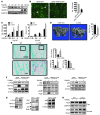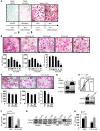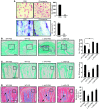Chloroquine reduces osteoclastogenesis in murine osteoporosis by preventing TRAF3 degradation
- PMID: 24316970
- PMCID: PMC3871219
- DOI: 10.1172/JCI66947
Chloroquine reduces osteoclastogenesis in murine osteoporosis by preventing TRAF3 degradation
Abstract
The cytokines RANKL and TNF activate NF-κB signaling in osteoclast precursors (OCPs) to induce osteoclast (OC) formation. Conversely, TNF can limit OC formation through NF-κB p100, which acts as an inhibitor, and TNF receptor-associated receptor 3 (TRAF3); however, a role for TRAF3 in RANKL-mediated OC formation is unknown. We found that TRAF3 limits RANKL-induced osteoclastogenesis by suppressing canonical and noncanonical NF-κB signaling. Conditional OC-specific Traf3-KO (cKO) mice had mild osteoporosis and increased OC formation. RANKL induced TRAF3 degradation via the lysosome/autophagy system. The autophagy/lysosome inhibitor chloroquine reduced RANKL-induced OC formation and function by increasing TRAF3 expression in OCPs in vitro and in vivo. Although chloroquine had no effect on basal bone resorption, it inhibited parathyroid hormone- and ovariectomy-induced OC activation in WT, but not cKO, mice. Deletion of the transcription factor gene Relb resulted in increased TRAF3 expression in OCPs, which was associated with decreased RANKL-induced TRAF3 degradation. RelB directly increased expression of BECN1, a key autophagy regulator, by binding to its promoter. These data indicate that autophagic/lysosomal degradation of TRAF3 is an important step in RANKL-induced NF-κB activation in OCPs. Furthermore, treatments that increase TRAF3 levels in OCPs, including pharmacological inhibition of its degradation with compounds such as chloroquine, may limit bone destruction in common bone diseases.
Figures








Similar articles
-
RANKL cytokine enhances TNF-induced osteoclastogenesis independently of TNF receptor associated factor (TRAF) 6 by degrading TRAF3 in osteoclast precursors.J Biol Chem. 2017 Jun 16;292(24):10169-10179. doi: 10.1074/jbc.M116.771816. Epub 2017 Apr 24. J Biol Chem. 2017. PMID: 28438834 Free PMC article.
-
NF-kappaB p100 limits TNF-induced bone resorption in mice by a TRAF3-dependent mechanism.J Clin Invest. 2009 Oct;119(10):3024-34. doi: 10.1172/JCI38716. Epub 2009 Sep 21. J Clin Invest. 2009. PMID: 19770515 Free PMC article.
-
Bone Remodeling and the Role of TRAF3 in Osteoclastic Bone Resorption.Front Immunol. 2018 Sep 28;9:2263. doi: 10.3389/fimmu.2018.02263. eCollection 2018. Front Immunol. 2018. PMID: 30323820 Free PMC article. Review.
-
TNF Induction of NF-κB RelB Enhances RANKL-Induced Osteoclastogenesis by Promoting Inflammatory Macrophage Differentiation but also Limits It through Suppression of NFATc1 Expression.PLoS One. 2015 Aug 19;10(8):e0135728. doi: 10.1371/journal.pone.0135728. eCollection 2015. PLoS One. 2015. PMID: 26287732 Free PMC article.
-
Regulation of TNF-Induced Osteoclast Differentiation.Cells. 2021 Dec 31;11(1):132. doi: 10.3390/cells11010132. Cells. 2021. PMID: 35011694 Free PMC article. Review.
Cited by
-
4-Acetylantroquinonol B Inhibits Osteoclastogenesis by Inhibiting the Autophagy Pathway in a Simulated Microgravity Model.Int J Mol Sci. 2020 Sep 22;21(18):6971. doi: 10.3390/ijms21186971. Int J Mol Sci. 2020. PMID: 32971944 Free PMC article.
-
Puerarin inhibits the osteoclastogenesis by inhibiting RANKL-dependent and -independent autophagic responses.BMC Complement Altern Med. 2019 Oct 15;19(1):269. doi: 10.1186/s12906-019-2691-5. BMC Complement Altern Med. 2019. PMID: 31615565 Free PMC article.
-
CST6 suppresses osteolytic bone disease in multiple myeloma by blocking osteoclast differentiation.J Clin Invest. 2022 Sep 15;132(18):e159527. doi: 10.1172/JCI159527. J Clin Invest. 2022. PMID: 35881476 Free PMC article.
-
Vindoline Inhibits RANKL-Induced Osteoclastogenesis and Prevents Ovariectomy-Induced Bone Loss in Mice.Front Pharmacol. 2020 Jan 22;10:1587. doi: 10.3389/fphar.2019.01587. eCollection 2019. Front Pharmacol. 2020. PMID: 32038256 Free PMC article.
-
Myeloid cell TRAF3 regulates immune responses and inhibits inflammation and tumor development in mice.J Immunol. 2015 Jan 1;194(1):334-48. doi: 10.4049/jimmunol.1401548. Epub 2014 Nov 24. J Immunol. 2015. PMID: 25422508 Free PMC article.
References
Publication types
MeSH terms
Substances
Grants and funding
LinkOut - more resources
Full Text Sources
Other Literature Sources
Medical
Molecular Biology Databases
Research Materials

